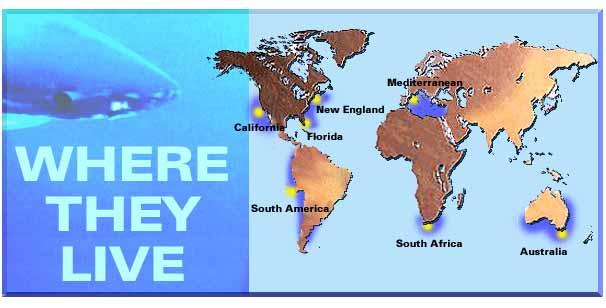|
The Great White Shark is often
portrayed in popular movies as a vicious predator
cruising populated beachwaters the world over in search
of a human meal. While it has indeed been spotted
occasionally in a wide range of waters, they appear to
mostly favor coastal temperate regions rather than open
seas. Find out where they live and the measures countries
have taken to protect them from commercial and sport
fishing.

Australia
White sharks prefer the temperate waters off the
Australian coast. By 1990, Dangerous Reef in Southern
Australia, formerly a popular shark viewing area, had
nearly been fished out. The White Shark is now protected
from commercial fishing Southern Australia waters and
Eastern Australia deemed it a protected species in Dec.
1996. Shark netting now stretches along 50 miles of coast
to protect bathers from sharks. The International Shark
Attack File has recorded 32 unprovoked Great White
attacks in Australian waters from 1876 to 1994.
California
Great Whites exist along the central California coast in
the Red Triangle--between Santa Cruz in the south and
Bodega Bay in the north and then west of San Francisco.
Currently, they are a protected species off coastal
waters. Federal officials have banned the practice of
shark baiting along the central coast. According to the
International Shark Attack File, 67 unprovoked great
white attacks, or 42.4 percent total great white attacks
worldwide, occurred in California waters from 1876 to
1994.
Florida
Great Whites live in both the Atlantic and Gulf Coast
waters of Florida. However, they're not as abundant as
other species of sharks in the region. With the Passage
of the Marine Mammal Protection Act in 1972 that made it
illegal to kill whales, porpoises, and dolphins in U.S.
waters, fishermen could no longer attract sharks with the
flesh of these mammals.
Mediterranean (Mediterranean Sea Sharks Page)
While Great Whites are not common in this region, they
have been seen in French waters and in the Mediterranean.
They are primarily coastal fish rather than oceanic, and
can penetrate shallow bays in continental coastal waters.
Since they can raise their body temperature 10 degrees
above the water's temperature, they are able to sustain
cooler waters.
New England/Atlantic
Coast
According to a study by the International Shark Attack
File, analyzing the persiond from 1876 to 1994, the
Atlantic coast accounts for 3 percent of great white
shark attacks worldwide, with 6 confirmed unprovoked
incidences. After years of consideration, the National
Marine Fisheries Service proposed measures in Dec. 1996
to protect depleted populations of Atlantic coastal
sharks. The plan covers 39 species more than 200 miles
offshore and is aimed at controlling the damage done by
commercial fishing and popular shark tournaments.
South Africa
South Africa is one of the most popular destinations for
white sharks, especially Cape waters, where they can
feast on seals and sea lions. After decades of sport
fishing began to deplete their numbers, they're now a
protected species off South African waters. Netting
protects swimmers in beach waters, where 16 unprovoked
great white shark attacks, or 10.1 percent of total white
shark attacks worldwide from 1876 to 1994, were
documented by the International Shark Attack File.
|